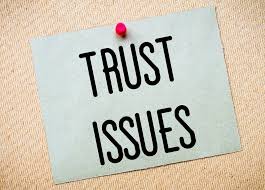Here’s Why You Have Trust Issues

Just when things start to get great, you feel a twisting in your gut. Should you be trusting this person? Dating expert Christopher Isaac has the answers.
We know exactly why you have trust issues. Were you cheated on? Most likely. Did it hurt? Absolutely. Are you over it? Maybe, it depends how you look at it. Believe it or not, your trust issues are actually a neurochemical reaction caused by classic conditioning. It’s okay if you’re confused; I’ll explain:
Your Happy (and Sad) Chemicals
I’ve mentioned the power of neurochemistry before, but I cannot stress how important your neurochemicals are when it comes to your behavior in relationships. Here’s a quick review:
Oxytocin: This is the chemical that gives you feelings of love, trust, and intimacy.
Cortisol: This is your stress hormone. It’s in charge of telling you when a situation is dangerous or stressful.
Both of these chemicals serve very important purposes in our relationships, particularly oxytocin. You can’t feel in love without it!
When You’re Cheated On
So here’s the scenario: You are head-over-heels in love, and you think he might be the one. A little more than a year into the relationship, you find out he’s been cheating on you with someone from his office. The oxytocin in your brain still insists that you love him, but now you are experiencing large amounts of cortisol. You’re upset, you’ve been betrayed, and your trust has been broken. This is your brain telling you to get out of this situation because it is harmful to you.
Conditioning
Have you ever heard of Pavlov? He had this nifty little experiment where he rang a bell and fed a group of dogs. After doing this for quite some time, he could ring the bell without there being any food, and the dog’s mouths would still water. They had come to associate the bell with food.
Even though we have more reasoning than dogs, we experience similar conditioning. When your cell phone beeps, your instinct is to check it. Unfortunately, we can be conditioned in more harmful ways. For example, if you’ve been cheated on—especially if it has happened more than once—your brain may begin to associate oxytocin with cortisol. After all, isn’t that what happened the last time you felt so in love? Your brain has learned that falling in love leads to pain, and it releases cortisol when you begin to feel love again. This explains why you you get anxious about trusting new boyfriends when you start falling in love with them—even if they haven’t hurt you.
How to Get Rid of Your Trust Issues
Unfortunately, overcoming these trust issues demands conditioning yourself. In other words, you need to retrain your brain to no longer release cortisol when you experience feelings of trust and love. In order to overcome these feelings, you need to challenge them and win. The next time you get that gut feeling that something isn’t right, challenge it. If you are correct about your new partner, your brain will reward you for it!
Overcoming your trust issues is a long, painstaking process. However, I am confident that you can do it. Your future relationship depends on it. Best of luck out there.
With Love,